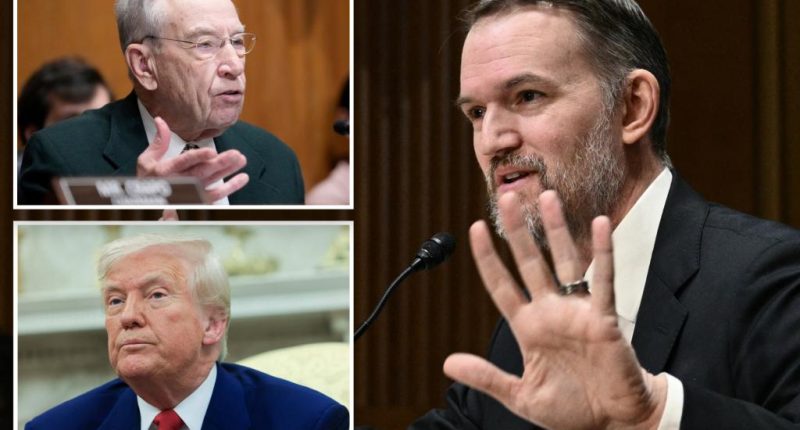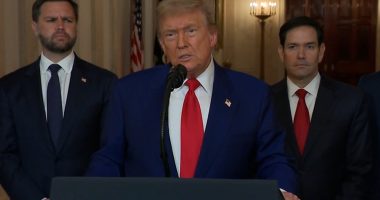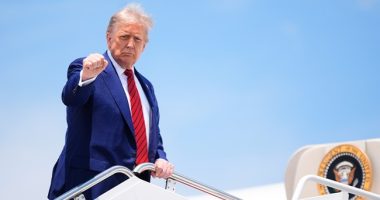
US Trade Representative Jamieson Greer told a committee full of skeptical senators Tuesday that escalating trade tensions won’t “be resolved overnight,” but insisted the US economy is strong enough to withstand President Trump’s duty regime.
“Our trade deficit, driven by these nonreciprocal conditions, is a manifestation [of] the loss of the nation’s ability to make, to grow, to build, and the president recognizes the urgency of the moment,” Greer told the Senate Finance Committee.
“Our large and persistent trade deficit has been over 30 years in the making, and it will not be resolved overnight, but all of this is in the right direction.”
Trump, 78, unveiled the largest slate of tariffs in nearly a century April 2, plunging the markets into disarray.
Members of both parties were unclear on the precise objectives Tuesday, and Greer provided little clarity.
“This is not a trade war. Most countries have said they’re not going to retaliate. We have an underlying emergency,” Greer argued when pressed by Sen. Tina Smith (D-Minn.). “The goal of this is [addressing] the trade deficit.
“The goal is to address that, and the offshoring that led to that, and the nonreciprocal treatment that led to that.”
The US has consistently held an overall trade deficit — meaning America imports more goods than it exports — since 1976, including a $1.2 trillion trade deficit last year.
Also Tuesday, Greer echoed Trump’s assertion that the White House is open to discussion with other nations about reducing the levies, though he declined to say how soon any deals might be reached.
“As the countries come to approach us,” he said, “what we’ve told them is, ‘If you have a better idea to achieve reciprocity, to get our trade deficit down, we want to talk to you, we want to negotiate with you.’”
Catherine Cortez Masto (D-Nev.) got Greer to concede that it took the first Trump administration two years to negotiate the United States-Mexico-Canada Agreement (USMCA) to replace the Clinton-era NAFTA deal, a time frame the trade rep described as “breakneck speed.”
“What I can say,” Greer told Sen. James Lankford (R-Okla.) at another point in the hearing, “is I’m moving as quickly as possible, and a lot of these countries are moving very quickly, and we’re working on the weekends.”
Other lawmakers were vexed by the lack of exemptions to the tariffs, to which Greer responded that Trump “has been clear with me and with others that he does not intend to have exclusions and exemptions, especially given the nature of the action.”
Greer also refused to indulge lawmakers who asked what it might take for Trump to back off on the tariffs, with possibilities such as soaring inflation, massive job losses or the stock market shedding half its value.
“The good news so far is that most countries have said they’re not going to retaliate on this and that they would like to seek to talk to us first [and] find out more about the programming,” said Greer, who estimated that around 50 countries have contacted the administration about new economic agreements.
Republicans on the committee were careful about directly badmouthing Trump’s tariff push, but some of them made clear they were uneasy about the move.
At one point, Sen. Thom Tillis (R-NC), who is up for re-election in 2026 in what is likely to be a close race, asked Greer point-blank: “Whose throat do I get to choke if this proves to be wrong?”
“I just talked to one of the senior folks on Wall Street, and he described today’s market as ‘a good day in hospice,’” Sen. Mark Warner (D-Va.) remarked at another point. “There are no good days in hospice.”
Last week, Sen. Chuck Grassley (R-Iowa) teamed up with Sen. Maria Cantwell (D-Wash.) to unveil legislation aimed at rolling back the president’s emergency trade powers.
Rep. Don Bacon (R-Neb.) has announced plans to pursue similar legislation in the House of Representatives. Trump had made clear he’d veto any such measure that reaches his desk..









